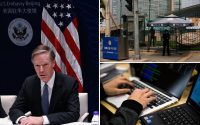House GOP subpoenas IRS officials at meeting with prosecutor couldn’t charge Hunter Biden
House Republicans have subpoenaed four senior Internal Revenue Service officials and FBI agents who reportedly overheard Delaware US Attorney David Weiss say last year he would not be able to charge first son Hunter Biden outside the First State.
The House Ways and Means Committee and Judiciary Committee are compelling testimony from IRS Director of Field Operations Michael Batdorf, IRS Special Agent in Charge Darrell Waldon, Baltimore FBI Special Agent in Charge Tom Sobocinski and Assistant Special Agent in Charge Ryeshia Holley on whether Weiss claimed he would not be given special counsel authority over the case and was blocked from bringing charges.
“Our Committees, along with the Committee on Oversight and Accountability, have sought these interviews since IRS whistleblowers came forward with concerning allegations of political interference in the investigation into Hunter Biden’s foreign influence peddling and tax evasion,” Ways and Means Chairman Jason Smith (R-Mo.) said in a statement.
“Unfortunately, the Biden Administration has consistently stonewalled Congress. Our duty is to follow the facts wherever they may lead, and our subpoenas compelling testimony from Biden Administration officials are crucial to understanding how the President’s son received special treatment from federal prosecutors and who was the ultimate decision maker in the case.”


IRS supervisory agent Gary Shapley said in a May 26 deposition before Ways and Means that Weiss told six witnesses at an Oct. 7, 2022, meeting that he was “not the deciding person” and US attorneys appointed by President Biden had not let him charge the first son outside Delaware.
The admission cut against sworn congressional testimony by Attorney General Merrick Garland earlier this year that Weiss had been granted “ultimate authority” on the question of whether to indict Hunter Biden.
Shapley said Weiss had “subsequently asked for special counsel authority from Main DOJ at that time and was denied that authority. Instead, he was told to follow the process, which was known to send US Attorney Weiss through another President Biden-appointed US Attorney.”

The whistleblower’s legal team also produced Shapley’s meeting minutes to the committee, which recounted Weiss saying DC US Attorney Matthew Graves had refused to partner on charges for Hunter.
Shapley emailed the minutes to Waldon, his supervisor, saying Weiss’ comments were “a huge problem” and “inconsistent with DOJ public position and Merrick Garland testimony.”
“Thanks, Gary. You covered it all,” Waldon responded on Oct. 11, 2022, apparently confirming his account of the day’s events.

Shapley’s lawyers said the FBI agents, Sobocinski and Holley, and Justice Department prosecutors Shawn Weede and Shannon Hanson, who worked in Weiss’ office on the case as a criminal chief prosecutor and assistant prosecutor, were also present.
Smith said Monday that the committee had asked for testimony from the six witnesses in a June 29 letter, threatening impeachment proceedings against Garland if agency heads did not comply.
Shapley and IRS special agent Joseph Ziegler both testified to the House Judiciary Committee in July that Weiss’ office prevented investigators from taking certain steps to strengthen their case — and discouraged lines of inquiry that led to the president.
A former FBI supervisory agent backed Shapley’s testimony in a July 17 deposition with the House Oversight Committee, saying he and the IRS agent were barred from interviewing Hunter Biden in December 2020 after the president’s transition team was tipped off about the plan.

IRS Commissioner Daniel Werfel apparently rebuffed that request in a July 13 letter, citing ongoing discussions with the Department of Justice about “pending litigation.”
Committee staff sent a follow-up letter on July 21 threatening subpoenas if interviews were not scheduled.
On July 26, Hunter Biden’s plea deal with federal prosecutors blew up in Delaware federal court over the scope of an apparent immunity clause tucked into a separate diversion agreement.
The deal would have had Hunter plead guilty to two tax misdemeanors over $1.5 million in income he earned in 2017 and 2018. It also would have required him to submit to a drug diversion program for lying about his crack cocaine use on a gun purchase form.
US District Judge Maryellen Noreika questioned whether Hunter’s defense team and prosecutors from Weiss’ office were asking her to “rubber stamp” the agreement, which would have prevented charging the first son for past crimes.
The questioning forced Weiss’ team to state that their investigation into the first son’s tax and gun crimes was “ongoing” — causing Hunter’s attorney Chris Clark to say that the parties had no deal.
Prosecutors have since withdrawn their case from Delaware and are expected to bring charges in either Southern California or the District of Columbia.
Garland elevated Weiss to special counsel Aug. 11 — despite concerns among congressional Republicans over his handling of the case and granting of the plea deal.


